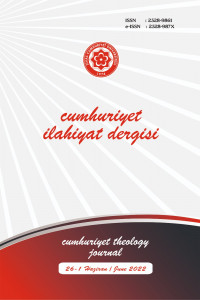The Nature of Regret as Emotion of Moral Self-Control
The Nature of Regret as Emotion of Moral Self-Control
Author(s): Muhammet Caner IlgaroğluSubject(s): History of Philosophy, Philosophy of Mind, Cognitive Psychology
Published by: Cumhuriyet Üniversitesi İlahyat Fakültesi
Keywords: History of Philosophy; Philosophy of Emotion; Human Being; Emotion of Regret; Moral Self-Control; Moral Value;
Summary/Abstract: Emotions are human attributes that are directly related to the epistemic, ethical, and aesthetic aspects of human beings. While man builds a meaningful, valuable, and beautiful life, gets motivation from emotions along with the mind. Emotions, with their multifunctional aspect, are means for determining, activating, directing, influencing, transforming, restraining, and sometimes manipulating human intentions, attitudes, and actions. For this reason, any research that treats human actions, especially morality, has to deal with emotions. The way to know the human being is to understand his emotions in his practical life. Therefore, in the gap between the stability of the theoretical and the dynamism of life, emotions become the subject of philosophical research. It is not easy to express the dynamic aspect and unbounded nature of emotion within the limits of language. However, for human beings, emotions are effective in their decision-making processes, intentions, orientations, and choices, in which they understand themselves, the universe, nature, matter, individuals, societies, goodness, evil, valuable and non-valued things, cope with facts and events, manage their practical life, stands out as dynamic, functional and cognitive attributes inherent in all these processes. Man experiences a wide variety of emotional states in his daily life. Thus, he has constantly changed moods with these emotional states he experiences. These experiences can be caused by external factors as well as by the influence of the internal dynamics of the human being. In terms of his social life, man has a dynamic moral life that gives emotional reactions and receives emotional effects. In this context, emotions enable man to establish a balance between himself and the self of the society in which he lives and determine his basic orientations. Emotions are motivating faculties that motivate a man to act and guide his imaginations, and evaluations of the past, present, and future. Regret is an emotion of moral self-control that addresses the self and internally organizes and constructs its morality. This emotion plays a central role, especially in the field of moral values, with its nature that affects man both in individual and social life. Regret, in its simplest form, appears in the form of a bitter feeling that includes the negative judgment of man's past action or inaction and is expressed with the expression of a wish. The emotion of regret is formed by the effect of internal influences in humans. Like most moral emotions, regret includes both a phenomenological sense and a cognitive judgment. Regret which is a psychologically and conceptually complex emotion, reveals a series of emotions such as sadness, disappointment, longing, nostalgia, and sometimes the relief of not regretting something. Regret can also manifest itself as a strong, motivating sadness and a passionate complaint that things are not going as planned. It is an experience of pain, often retrospective, that shapes our present and future. Regret is an emotion that arises with awareness, usually expressing disapproval of what the person did, wishing it to be different, upset, ashamed, or guilty. Regret is part of human self-control, which encourages man to learn from past and present mistakes and to correct future behavior. This emotion is a corrective and healing sense of moral self-control that arises as a result of one's internal accounting for one's actions. Regret is a necessary consequence of man's moral nature. This emotion stems from the fact that he is a being that can choose, that is, his moral freedom. For regret to occur, the moral action must have taken place as a result of a choice to be made among at least two alternatives. Therefore, the prerequisite for repentance is freedom. The reciprocal roles of reason and emotion on our thoughts and actions are particularly evident in the phenomenon of regret. For that reason, regret, whether in the practical or theoretical field, is an emotion related not only to the emotional side of humans but also to the cognitive side. The fact that regret is a state of sadness that occurs when a person realizes his mistake on a phenomenon that has been experienced in the past or whose effect continues today, shows that it is an emotion of evaluation. Since the activating aspect of the emotions will be backward dysfunctional in regret, this incentive aspect manifests itself in the direction of preventing the repetition of the regretful situation in the future. Thus, a sad situation in the past will pave the way for a moral evolution from negative to positive, from destructive to constructive. In this article, the nature, value, and functionality of the regret will be analyzed and interpreted from a philosophical point of view, taking into account the principles of emotion ethics, and its conceptual and theoretical framework.
Journal: Cumhuriyet İlahiyat Dergisi
- Issue Year: 26/2022
- Issue No: 1
- Page Range: 365-374
- Page Count: 10
- Language: English

